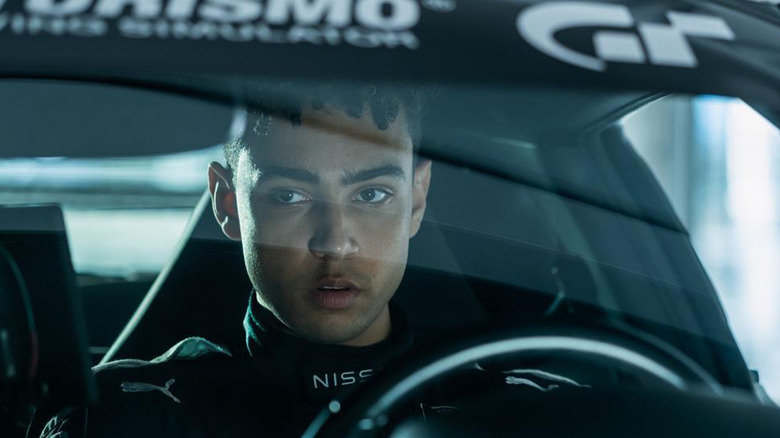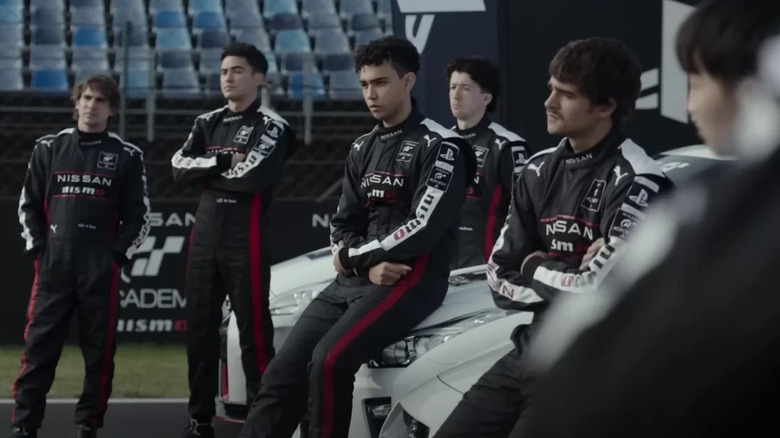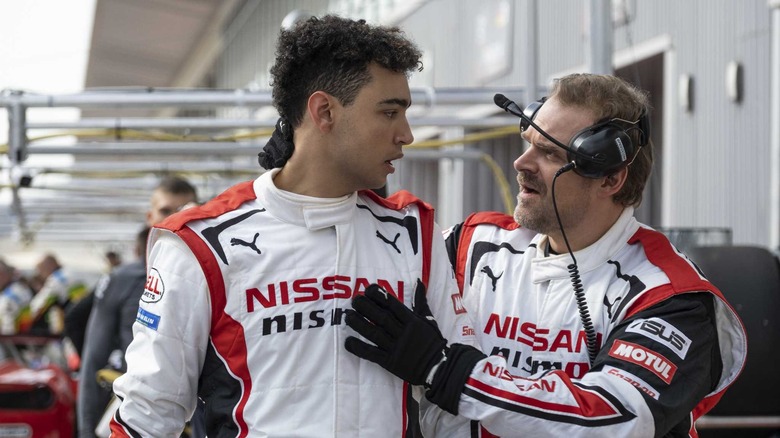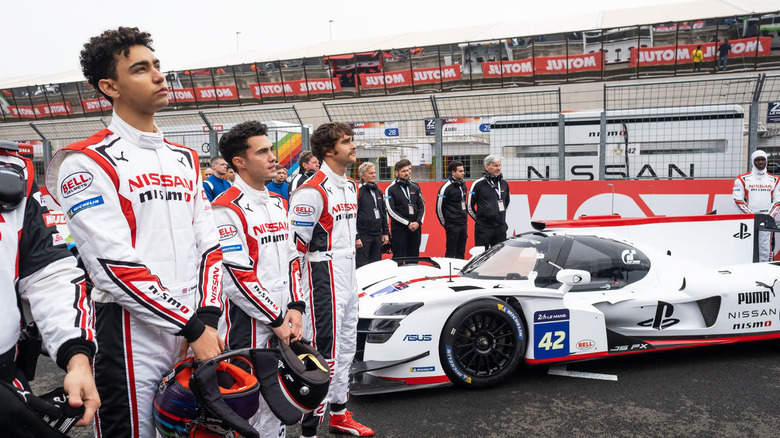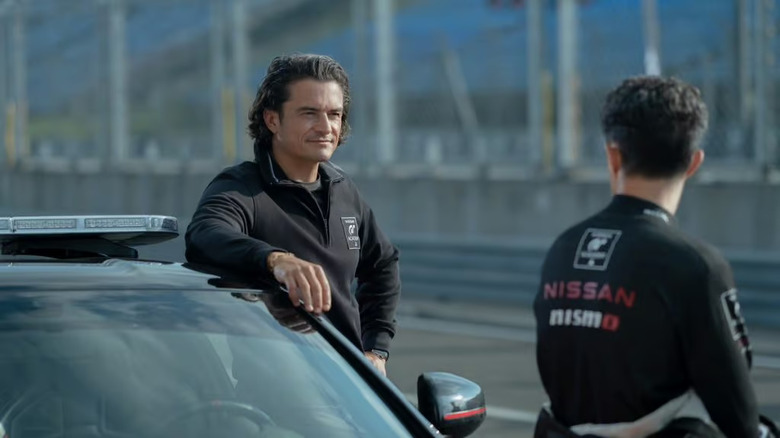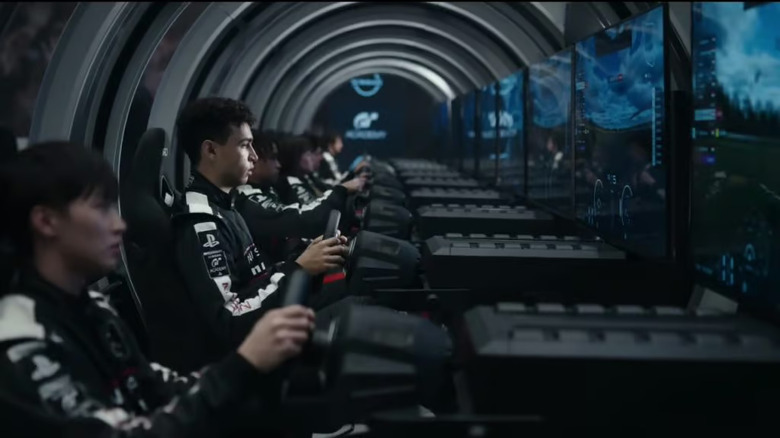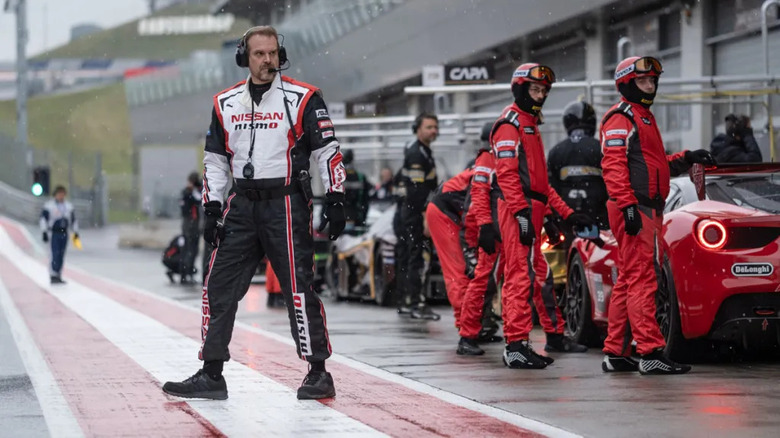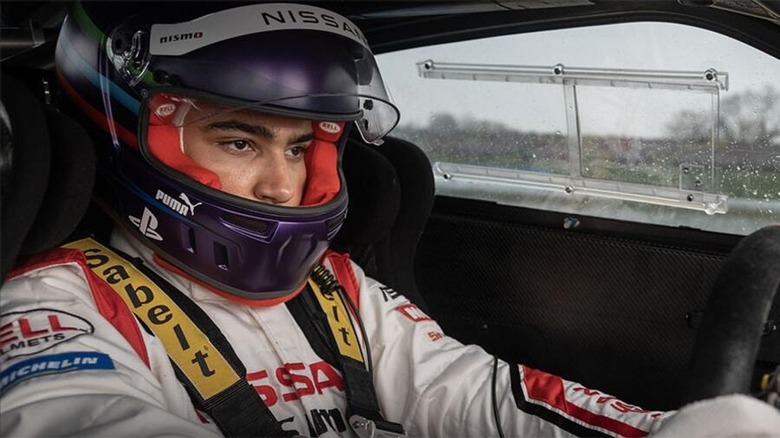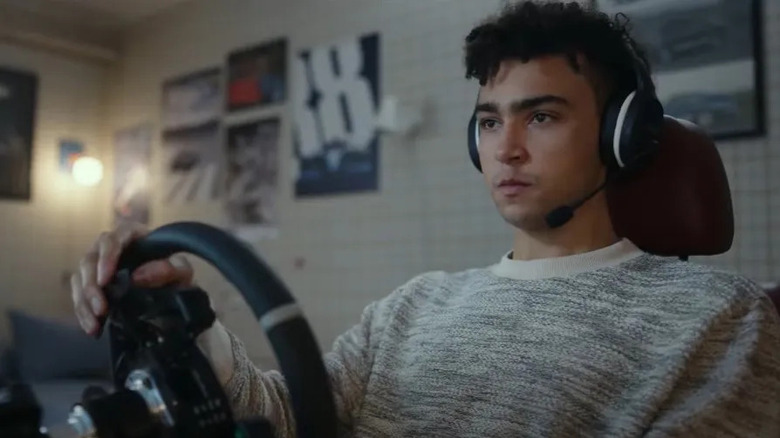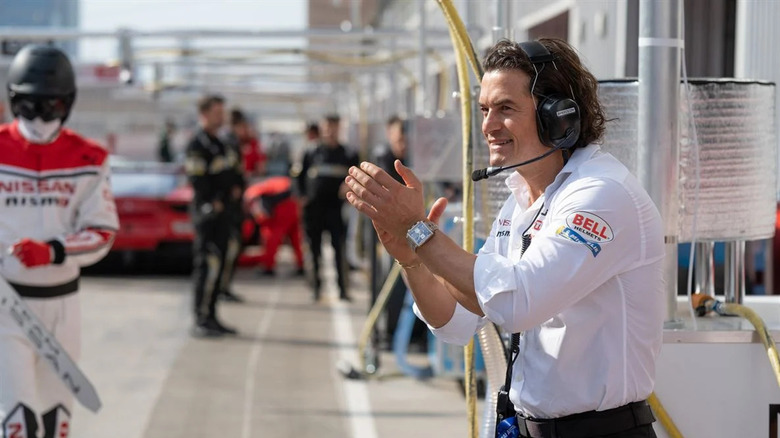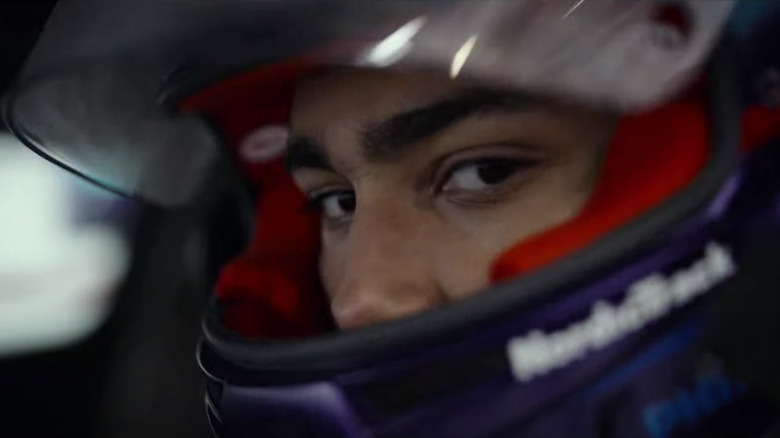The Ending Of Gran Turismo Explained
Contains spoilers for "Gran Turismo"
After delivering two acclaimed TV series based on their renowned games — "The Last of Us" and "Twisted Metal" — Sony and PlayStation head back to the big screen for a story in the world of "Gran Turismo." Unlike most video game movies, the film's story isn't directly based on the simulation racing games and instead takes inspiration from a real-life story connected to the franchise's legacy. The film tells the story of Jann Mardenborough (Archie Madekwe) — a "Gran Turismo" player who's invited to compete in an experimental competition called "GT Academy." There, Jann is tasked with learning how to drive actual race cars and beating out the other top "Gran Turismo" players chosen for the competition. If Jann can win GT Academy, he'll earn his chance to make his dreams of becoming a professional racer come true.
"Gran Turismo" not only gives audiences all the intense racing they can handle, but the film also delivers an emotional underdog story set within a highly dangerous sport. With every sense of doubt and danger that Jann faces in his journey for success, he becomes more determined to prove himself, and audiences will easily rally around him. It all builds toward a tense finale that sees Jann put everything on the line to gain the respect and acclaim he deserves. So let's delve into the biggest moments from the film's ending and even look at how it even compares to Jann's real-life story.
What you need to remember about the plot
Before we delve into the film's finale, though, let's look at the biggest moments leading up to it. After Nissan marketing executive Danny Moore (Orlando Bloom) gets approval to create the competition series GT Academy and recruits bitterly retired racer Jack Salter (David Harbour), he starts to pick out competitors from across the globe. British hopeful Jann Mardenborough joins the competition after earning his spot in a virtual qualifying race. Although Jann and his fellow competitors are hopeful that their dreams will become a reality, Salter gives them a reality check through some harsh but necessary training. Despite Salter's tough training methods that push everyone to their limits, Jann is not only able to improve his skills but ultimately comes out victorious by the narrowest of margins.
Before being able to join the ranks of the world's top racers, though, Jann must earn his professional license and contract with Nissan by placing fourth or higher in a qualifying series. Although Jann's first race doesn't go well, he steadily improves and is eventually able to place high enough to earn his license and start his professional career. Shortly after signing his contract with Nissan, Jann enters his first race. Though things start well, it ends in disaster. Jann's car unexpectedly flips in the air and crashes into a spectator section — accidentally killing a spectator. This tragedy causes Jann to blame himself for what happened and give up racing altogether.
What happened at the end of the movie
Although Salter had his doubts about Jann and his fellow competitors' ability to actually compete in motorsport, he slowly starts to see how capable they are — especially Jann. By the time Jann earns his professional license, Salter completely believes in him and is arguably his biggest supporter. After Jann's accident, though, Salter is crushed by Jann's decision to quit racing because Jann evokes a sense of passion and love for racing that's all but evaporated from Salter's perspective. Salter ultimately decides to reach out to Jann and take him for a drive back to where the tragic accident occurred. There, he finally tells Jann what caused him to stop racing — and it turns out that it's similar to what Jann is going through.
Salter was also involved in a tragic accident at the peak of his career, which caused a fatality that he was never able to shake. Like Jann, though people told Salter that it wasn't his fault, he was never able to fully let it go, and it caused him to struggle to get back into the driver's seat. To this day, Salter still regrets it and doesn't want Jann to see him go down the same path. Salter's story ends up inspiring Jann to not only reignite his racing career but also achieve the dreams that were cut short for Salter in his honor.
What happened during the final race?
Although Jann is ready to return to racing, Danny gives him some unfortunate news. While Jann isn't seen as responsible for the accident, others would rather have him no longer race. Most of the other drivers have signed a petition to keep "simulation racers" like Jann from competing — causing some of Jann's sponsors to consider pulling their support. With Jann not wanting to quit, he comes up with a way for them to prove that he belongs — by placing on the podium at the 24 Hours of Le Mans with a team of simulation racers.
Salter and Danny agree with Jann and call for his GT Academy adversaries Matty (Darren Barnet) and Antonio (Pepe Barroso) to race alongside him in a three-man team. Before the race starts, Jann is also able to reconcile with his father (Djimon Hounsou) – gaining the support and acceptance he's yearned for. Unfortunately, Jann struggles early in the race as he's consumed by fear after witnessing another driver crash. However, with the help of Salter reminding Jann of what he's driving for and playing some of his music to calm and motivate him, Jann is able to get in the right headspace. Despite some issues with the pit crew, Jann is able to fight back in the race and ultimately lead his team to a third-place finish — cementing their place in history and squashing any doubt he would be able to qualify.
How does the ending reflect the true story
Shortly after Jann and his team celebrate on the podium, the film delivers some small tidbits about Jann Mardenborough's real-life career and involvement with the film. Alongside some photos of Mardenborough's real experience competing in GT Academy and driving professionally, the film acknowledges that he has competed in over 200 races and earned many achievements in his career. As an added bonus, the film even tells viewers that Mardenborough actually acts as the stunt double for Madekwe in the film. So any exterior shots of race sequences actually have the real-life Jann Mardenborough driving — which is pretty awesome. However, the bigger question is: How much of what we see in the film is true to Jann's real-life story?
While certain characters like Jack Salter are solely made up for the film, the events of the story are pretty accurate — but somewhat told out of order. For instance, the catastrophic accident that caused Jann to crash into a field of spectators actually happened a couple of years after he placed third at Le Mans. Also, he didn't race alongside other GT Academy graduates at Le Mans and actually raced with GT Academy alumni at the Spa 24 Hours instead. So though Jann's story in the film is inspired by actual events in Mardenborough's career rather than wholeheartedly based on them, "Gran Turismo" does its best to pay homage to the achievements and impact Mardenborough has had on the motorsport world.
What does the end of the movie mean
One of the biggest debates throughout the film is whether simulation players can hack it at the real thing. That question is what drives Danny to create GT Academy and causes Salter to openly doubt all the participants at the start of the competition. Jann is at the center of this debate as well. He's continually trying to prove that his doubters are wrong and that the "Gran Turismo" community should be taken seriously. While there is a noticeable adjustment period for Jann and other GT Academy competitors, since driving a virtual car is obviously different than getting behind the wheel of a high-speed racecar, Jann eventually puts his doubters in check — namely Salter.
When Jann enters the world of professional racing, he's quite a force to be reckoned with. He continually improves his craft and honestly impresses people in his first race — though it doesn't end in victory. Jann is living proof that simulation and video game skills can translate to reality and serve as a great stepping stone for someone wanting to be involved in the real thing. After all, moments like Jann knowing parts of the car Salter didn't think he would and understanding how to make passes on turns are great instances of the game connecting with reality. The film further gives the "Gran Turismo" community — and, really, other sim communities — a voice and shows that they are very capable of turning their virtual passions into reality.
Another explanation for the ending of Gran Turismo
As much as "Gran Turismo" is an inspiring underdog story that sees Jann achieve his dreams, it's also a bit of a cautionary tale. Sure, there's a lot of heartwarming success seen in Jann's journey, but it doesn't overshadow how the film highlights the dangers of motorsport. Before Jann even starts his GT Academy journey, Salter makes it clear to him and others that they could potentially die if things go wrong. He even says that there would be no shame in quitting because of that, either, and that he wouldn't let anyone he didn't believe in sit in the driver's seat. At first, this can just seem like scary talk from Salter to try and intimidate everyone, but it quickly becomes clear that he's not wrong.
The crashes in "Gran Turismo" prove how vicious and genuinely deadly motorsport can be. One wrong twitch during a turn or slight hesitation can lead to the death of other drivers, spectators, and even yourself. Jann experiences this multiple times throughout the film — not only does he see a fiery crash at Le Mans that the driver miraculously survives, but he's also involved in a crash that accidentally kills a spectator. The psychological trauma drivers can suffer from is equally horrifying. Jann's and Salter's minds are shown to be severely affected by crashes, and the mortified reactions of Jann's parents when he crashes are haunting. "Gran Turismo" equally showcases and analyzes the grounded horror of motorsport.
Dreams can come true
At its core, "Gran Turismo" is another classic sports underdog story meant to not only warm viewers' hearts but also inspire them to embrace their own passions. Like any classic sports underdog, Jann faces his fair share of adversity. From his father totally disapproving of his aspirations to become a racer to Salter pouring doubt on his high hopes throughout his time at GT Academy, there wasn't much support for Jann. Not to mention, he has to face and ultimately beat his GT Academy competitors — who are equally as talented as him. Even when he finally earns his chance to race in professional circuits, he's looked down upon by other drivers and is forced to deal with an accident that was beyond his control.
Yet Jann constantly perseveres and pushes past the obstacles in front of him through his sheer determination. He always finds ways to break past his limits and impress those who doubt him. His father and Salter certainly become impressed by his drive and ultimately become his most pivotal supporters. It's what makes Jann leading a landmark performance at Le Mans so impactful and meaningful, as audiences have been with him every step of the way. "Gran Turismo" is a classic sports story through and through — with underdog vibes that remind viewers that everyone's dreams can come true no matter how big or small.
Why Le Mans means so much to the finale
The film ending on Jann Mardenborough's legendary performance at the 24 Hours of Le Mans actually holds more meaning to the film and the wider racing world. At the start of the film, Jann is seen racing his friend online in "Gran Turismo" on the Le Mans track. So his racing in the real-life endurance race in the finale brings his journey full circle. Jann and his team placing third at Le Mans is arguably one of his most notable achievements in Mardenborough's real-life professional career. It was the race that really put him on the map and helped him break away from solely being looked at as just the GT Academy winner.
Le Mans also being the setting for the film's finale is also pretty meaningful for both fans of the sport and even more general fans since the race has an iconic legacy in the sport. The 24 Hours of Le Mans is easily one of the most well-known and highly regarded events in the racing world. As said in the film, placing there basically solidifies you as a legend in the sport. It's a setting that really elevates the meaning behind Jann and his team trying to get "sim racers" like themselves the respect they deserve. While Le Mans would be a pretty noteworthy finale setting for any racing film, it holds a little more meaning for the characters of "Gran Turismo."
What does the ending mean for the Gran Turismo franchise?
Now for the usual question that comes after most movies that come from big studios nowadays: Does the film have franchise potential? Currently, there have been no announcements made that a sequel for "Gran Turismo" has gone into development and frankly, there probably won't be one. Given that the film is based on the real-life story of Jann Mardenborough rather than an original story set within the world of the games, there aren't many ways for a sequel to "Gran Turismo" to happen. A sequel could potentially continue to focus on Mardenborough's career and depict a different chapter in his life. Or maybe a sequel could focus on another winner from GT Academy, as there were multiple seasons and some competitors — like Nicolas Hammann and Mark Shulzhitskiy — could have interesting stories to tell.
There's also a chance that a follow-up film could potentially just tell a completely original story and maybe crossover with Jann at some point. However, with the first film being based on a real story, it would probably be smarter to just continue that trend. Plus, "Gran Turismo" being a biopic is actually what makes it unique compared to other video game movies. So an original story likely isn't in the cards either. If the film does well at the box office, maybe Sony and PlayStation will want to do more. For now, though, fans shouldn't expect another "Gran Turismo" film any time soon.
What the ending of Gran Turismo says about PlayStation's adaptations of their games
Although Sony and PlayStation have shown interest in turning their movie and TV adaptations into the same type of successful franchises that their games are, the ending of "Gran Turismo" says something different. While we already know that a second season of "The Last of Us" is coming and that the endings of "Uncharted" and "Twisted Metal" hint at potential futures, "Gran Turismo" is the first adaptation from them that feels closed and done. The ending simply highlights Jann Mardenborough's success in the film and real life and doesn't present a bigger future ahead. So there could be more one-and-done PlayStation adaptations that come in the future.
With PlayStation and Sony not trying to establish a big cinematic future for "Gran Turismo," the companies seem to have recognized that not every story needs guaranteed franchise potential to be considered worth adapting. So smaller PlayStation games like "Concrete Genie," "Ape Escape," "Shadow of the Colossus," or maybe even "Patapon" could get big- or small-screen adaptations one day. Prior to "Gran Turismo," PlayStation might be expected to try to turn all of its video game adaptations into robust franchises. But "Gran Turismo" changes that narrative with its ending, and closing the book on the "Gran Turismo" story opens the door for unthinkable adaptations to potentially happen.
